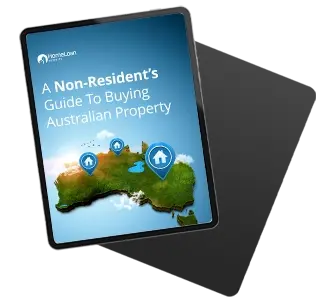Can A Temporary Resident Get A Home Loan?
Yes, you can get a home loan as a temporary resident in Australia.
To increase your chances of approval:
- Have a minimum of 12 months remaining on your visa
- Have a stable income and employment history
- Borrow up to 80% of the property value. You can borrow more if you’re buying together with an Australian citizen.
- Seek approval from the FIRB
Find Out If Your Visa Type Is Accepted
Enter your visa below and you’ll get information on whether your visa type will be accepted for a home loan.
How Much Can I Borrow?
The amount that you can borrow depends on the type of temporary visa that you hold:
- 80% of the property value: Most temporary visa holders can apply for a mortgage if they are allowed to work in Australia for at least 12 months.
- 90% of the property value: Some visa holders may be eligible to borrow up to 90% of the property value if they have a strong income, stable employment, and a longer-term visa.
- 95% of the property value: If you’re married to or in a de facto relationship with an Australian citizen or permanent resident, regardless of your visa.
Did you know that the services of a mortgage broker in Australia are usually free?
Please call us on 1300 889 743 or complete our free assessment form to have an obligation-free discussion with one of our mortgage brokers who specialize in lending to temporary residents living in Australia.
Which Temporary Residents Will Australian Banks Lend To?
The Australian government and the FIRB don’t restrict particular visa types from borrowing money, but Australian banks and other lenders may not approve loans for some temporary residents (TR).
Preferred visas
The list below includes visa types that Australian lenders tend to consider as “Australian citizens.” These visa holders may be entitled to borrow up to 95% of the property value:
- Interdependency Visa (subclass 310/110 and 826/814).
- Spouse / spousal / partner visa (subclass 309/100 and 820/801).
Accepted visas
The list below includes visa types that Australian lenders tend to consider as “non-residents” and will restrict the loan to 80% to 90% of the property value. If you’re married to an Australian Citizen or PR, then you can borrow 95% of the property value:
- Temporary Business (Long Stay) – Standard Business Sponsorship (Subclass 457) and 482 Temporary Skill Shortage (TSS) visa loans available to 90% of the property value as a special exception to normal bank criteria. Conditions apply.
- Skilled Employer Sponsored Regional (Provisional) Visa (Subclass 494)
- Skilled Work Regional (Provisional) Visa – (Subclass 491)
- Temporary Work (Long Stay Activity) visa (Subclass 401).
- Temporary Work (International Relations) visa (Subclass 403).
- Investor Retirement visa (Subclass 405).
- Working Holiday Visa (Subclass 417).
- Business Owner (Provisional) Visa (Subclass 160).
- State or Territory Sponsored Business Owner (Provisional) Visa (Subclass 163).
- Senior Executive (Provisional) Visa (Subclass 161).
- State or Territory Sponsored Senior Executive (Provisional) Visa (Subclass 164).
- Investor (Provisional) Visa (Subclass 162).
- State or Territory Sponsored Investor (Provisional) Visa (Subclass 165).
- Skilled Regional (Provisional) visa (Subclass 489).
- Business Visitors Visa (Subclass 456).
- Visiting Academics Visa (Subclass 419).
- Sport Visa (Subclass 421).
- Entertainment Visa (Subclass 420).
- Skilled Exchange Visa (Subclass 411).
- Film, Media, Actors and Support Staff, Photographers and Journalists Visa (Subclass 423).
- Emergency Visas (Subclasses 302 & 303).
- New Zealand Citizen’s Family Members Visa (Subclass 461).
- Religious Worker Visa (Subclass 428).
- Skilled – Regional Sponsored visa (Subclass 475).
- Special Program Visa (Subclass 416).
- Prospective Marriage visa (Subclass 300).
- Medical Treatment Visa.
- Medical Practitioner Visa (Subclass 422, loans available to 90% of the property value).
- Sponsored Family Visitors Visa (Subclass 679).
- Special Category Visa (Subclass 444).
- Contributory Temporary Parent Visa (Subclass 173).
- Contributory Temporary Aged Parent Visa (Subclass 884).
- Student Visa (Subclass 572, 573, 574, 575 & 576).
- Temporary Graduate Visa (Subclass 485).
- Student Guardian Visa (Subclass 580).
- Business Innovation and Investment (Provisional) visa (Subclass 188).
- Holiday and Visiting Visas (Subclass 976).
- Short Validity Business ETA Visas (Subclass 977).
- Long Validity Business ETA Visas (Subclass 956).
- Bridging Visas (A, B, C, D & E).
If you’re a temporary resident, please call us on 1300 889 743 or fill in our free online assessment form to find out how much you can borrow.
Buying A Home in Australia As A Non-Resident
Everything you need to know as a non-resident buying a property in Australia.

Are You A Spouse Visa/Partner Visa Holder?
If you’re married to or in a relationship with an Australian citizen, New Zealand citizen, or Australian permanent resident, the banks will see you as a lower risk than other visa holders.
As a result, some lenders will assess your mortgage application as if you were an Australian citizen. For more information, please see our spouse visa mortgage page.
Are You A Significant Investor (Siv 188 Visa)?
The SIV 188 visa came into effect as a new stream within the Business Innovation and Investment (Provisional) (Subclass 188) and the Business Innovation and Investment (Permanent) (Subclass 888) visa on 24 November 2012.
Effectively, it allows high net worth (HNW) foreign investors to live in Australia for up to five years, with the option to apply for the permanent 188 visa.
We have more negotiating power with certain lenders for borrowers on the SIV visa.
For example, most lenders will only consider income in Australian Dollars (AUD). Others will accept foreign currency but will require that the majority of your income be the same as your country of residence.
With the Significant Investor Visa, some lenders may be willing to waive these requirements so you can qualify for a mortgage in Australia and grow your property portfolio.
If you are on a SIV 188 visa, call us on 1300 889 743 or complete our online enquiry form to start buying real estate in Australia.
Are You A Student Visa Holder Or An International Student?
Most banks will allow student visa holders to borrow funds to purchase a property in Australia.
The Foreign Investment Review Board (FIRB) doesn’t restrict students from buying a home or investment property as long as they meet standard FIRB criteria.
However, your ability to get approval for a loan largely depends on whether or not you have a stable job and a solid income. If you’re working, most banks will lend you 80% of the property value.
If you’re not working, then your parents may be able to purchase the house for you. Please see our student visa mortgage page for more information.
Can I Buy A House On A 485 Visa?
Yes, you can. However, only a few lenders might be able to assist, and the maximum Loan-to-Value Ratio (LVR) you can borrow is typically up to 80% of the property value.
When assessing your application while on a 485 Temporary Graduate Visa, lenders will consider the following:
- Whether you have at least 12 months remaining on your visa.
- Your intent to become a permanent resident of Australia.
- Whether you have obtained FIRB approval to buy property in Australia.
Are There Home Loans For Foreigners In Australia?
Yes, there are home loans available for foreigners in Australia. However, the interest rates for these loans are slightly higher than those offered to Australian citizens or permanent residents.
Speaking with a mortgage broker specialising in non-resident home loans can increase your chances of approval.
Should I Buy Now Or Wait To Become A Permanent Resident?
If you’re currently on a bridging visa and will receive your permanent resident (PR) visa, we recommend you wait.
Alternatively, if you can’t wait and you’re planning to buy with an Australian citizen or PR holder, you may want to consider purchasing in their name.
Some benefits of waiting to buy with a permanent resident are:
- You qualify with more lenders and might be eligible to borrow at lower rates.
- Skip the cost and hassle of FIRB approval.
- Save thousands on foreigner stamp duty surcharge.
Qualifying with more lenders
You’ll be eligible to borrow more at lower interest rates with a wider range of lenders.
The more lenders you qualify with, the better our negotiating power so you may save thousands.
Avoid FIRB approval
Temporary residents and 457 visa holders are required to get Foreign Investment Review Board (FIRB) approval.
If you get your PR, or marry someone who has it, you can avoid the cost and hassle of this government approval process.
Avoid the foreigner stamp duty surcharge
Temporary residents and 457 visa holders planning to buy residential property in all states and territories, except for the Northern Territory (NT) will have to pay a stamp duty surcharge.
The surcharge varies anywhere from 3% to 8% of the land value, depending on the state and can add tens of thousands of dollars to your purchase.
If you’re close to getting your PR anyway, you may want to wait so you can avoid the surcharge.
Of course, you can also avoid the surcharge if you buy along with an Australian citizen under a spousal visa arrangement.
Are You Buying With An Australian Partner?
If you are buying a property with an Australian partner, you don’t need to pay foreign stamp duty surcharge and get FIRB approval. This applies to:
- Temporary residents married to an Australian citizen
- Temporary residents in a de-facto relationship with a citizen or PR holder for at least two years.
Both of your names are on the mortgage, but only the Australian citizen’s name is on the property title. Having both names on the mortgage allows incomes to be considered when assessing borrowing power. You can read our page on one on title, two on loan for more information on this.
There are several factors that can increase your chances of approval:
- Being in a long-term relationship
- Having children together
- Having family or relatives already living in Australia
Apply For A Temporary Resident Mortgage Today!
We’re mortgage brokers who specialise in helping people without Australian citizenship apply for loans in Australia.
If you’d like to buy a property in Australia or want to know more about how we can help, call us on 1300 889 743 or complete our free online assessment form today.
Home Loan For Temporary Residents In Australia
Is Australian Government Approval Required?
Are First Home Benefits Available?
Are You A Temporary Resident With A Foreign Income?
What Documents Are Required?
Can I Get Approved For A Non-Resident Commercial Loan?
Still need answers? We're here to help!
Ask an expertOur team of mortgage experts will assist you within 24 hours.
